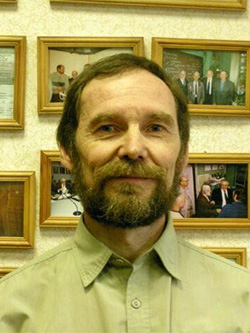
Prof. Dr. Pavel Skripov
Institute of Thermal Physics of the Ural Branch of the Russian Academy of Sciences, Ekaterinburg, Russia
Email: pavel-skripov@bk.ru
General information: Pavel Skripov, born in 1955, citizen of the Russian Federation. Institute of Thermal Physics of the Ural Branch of the Russian Academy of Sciences. The author (co-author) of about 200 publications, including 100 journal articles.
E-mail: pavel-skripov@bk.ru
https://www.researchgate.net/profile/P-Skripov-2
https://www.scopus.com/authid/detail.uri?authorId=6701855900
Scientific degree, academic title: The degree of Candidate of Physical and Mathematical Sciences was awarded in 1986; academic degree of Doctor of Physical and Mathematical Sciences awarded in 1999; the title of professor in Thermal Physics was awarded in 2018.
Experience: Experience of scientific work is 45 years. The experience of pedagogical work is 30 years. Led the author's lecture course "Thermal Physics of Fast Processes". Supervised 7 candidates of sciences (Ph.D.).
Area of scientific interests: At the Institute of Thermal Physics, he conducts research in the field of development of high-speed methods for studying heat transfer and thermophysical properties of complex compounds in the course of pulse heating. Leads the research of not fully stable liquids superheated with respect to the liquid-vapor equilibrium line and/or the liquid-liquid equilibrium line, as well as supercritical fluids.
Title: Heat transfer by not fully stable fluids: key findings
Abstract: The report marks the 95th anniversary of the birth of V.P. Skripov, author of the classic study of superheated and supercooled liquids. It presents a discussion focused on the early work carried out by Skripov and his research team during the 1950s and 60s. Due to their pioneering nature, these works laid the foundation for the study of metastable liquid states. lthough they remain relevant to this day, these groundbreaking works remain unknown to most non- Russian-speaking readers. As well as elucidating the behavior of the heat capacity of a solution in the liquid- liquid critical region, his research also concerns the features of light scattering and free-convective heat transfer in the liquid-vapor critical region of a one-component system. The issues involved in the discussion are united by the fluctuating nature of such phenomena. Indeed, the very possibility of their experimental study is due to a significant increase in the scale of fluctuations of the corresponding quantities when approaching the critical point. The ongoing development of the approaches proposed in these papers for solving contemporary problems in the thermophysics of superheated/supercritical fluids is discussed.